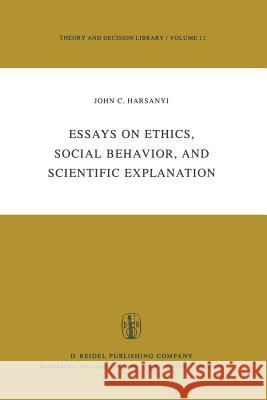Essays on Ethics, Social Behaviour, and Scientific Explanation » książka
Essays on Ethics, Social Behaviour, and Scientific Explanation
ISBN-13: 9789027711861 / Angielski / Miękka / 1980 / 278 str.
When John Harsanyi came to Stanford University as a candidate for the Ph.D., I asked him why he was bothering, since it was most un likely that he had anything to learn from us. He was already a known scho lar; in addition to some papers in economics, the first two papers in this vol ume had already been published and had dazzled me by their originality and their combination of philosophical insight and technical competence. However, I am very glad I did not discourage him; whether he learned any thing worthwhile I don't know, but we all learned much from him on the foundations of the theory of games and specifically on the outcome of bar gaining. The central focus of Harsanyi's work has continued to be in the theory of games, but especially on the foundations and conceptual problems. The theory of games, properly understood, is a very broad approach to social interaction based on individually rational behavior, and it connects closely with fundamental methodological and substantive issues in social science and in ethics. An indication of the range of Harsanyi's interest in game the ory can be found in the first paper of Part B -though in fact his owncontri butions are much broader-and in the second paper the applications to the methodology of social science. The remaining papers in that section show more specifically the richness of game theory in specific applications."











